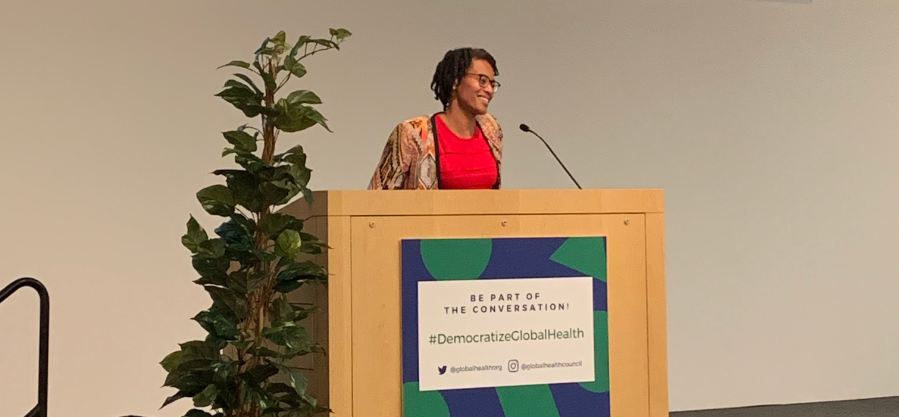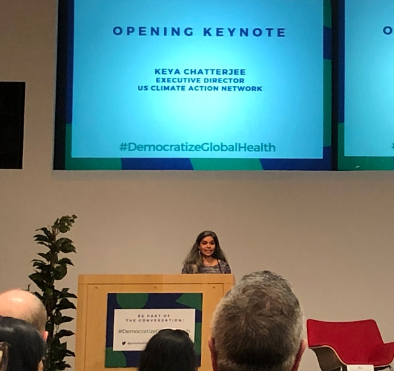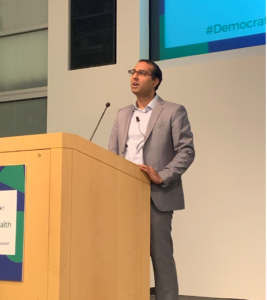Letter from Loyce: Time to Pass the Mic

Global Health Council President & Executive Director Loyce Pace speaks to attendees of the 2019 Global Health Landscape Symposium.
For the past four years (officially; but, technically, many more before that), Global Health Council has hosted an annual convening of key stakeholders to wrestle with the most pressing issues facing our community. At this year’s Global Health Landscape Symposium, held on December 6, there was an increased sense of urgency as we pursue new ideas and initiatives in global health that can fulfill our shared objectives. It was with this in mind that over 150 attendees came together to hear from a cadre of high level speakers and thought leaders. Most importantly, all participants engaged in a dialogue about the challenges that currently stand in the way of achieving global health goals and how we can, collectively, move beyond them.
While a far more comprehensive report is in development – and will be published soon – we wanted to share some of the themes that emerged from the day that particularly struck a chord.
What does “Country Ownership” really mean? It is an oft used, but arguably nebulous term. What we heard at the Symposium is that it means more than passing the buck or putting national governments in the driver’s seat. Nor does it mean 100% financial responsibility or just “government ownership.” Local ownership and civil society engagement is still largely missing quite uneven across the sector.
In addition, many countries have endured historic social injustice putting them at a significant economic disadvantage. As Health GAP’s Jamila Headley explained, “To pull entirely out of global support would be a further injustice.”
And it’s important to look at underlying causes of perceived inaction around country ownership. As Anuradha Khanal, of the Global Health Advocacy Incubator and the Campaign for Tobacco-Free Kids explained, it’s not due to lack of will, but other critical priorities, capacity, and a myriad of other issues that prohibit countries from fully owning their national health programs.

Keya Chatterjee, Executive Director of US Climate Action Network, gives the opening keynote at GHLS19. Photo credit: Global Health NOW.
We can’t solve structural problems with technical solutions. As a community, we are adept at coming up with innovations that can address health challenges – whether it be new treatments, services, or systems. While all of that is essential, it doesn’t solve underlying obstacles such as stigma, oppression, inequity, and exclusion. Technical fixes aren’t enough. We need to tackle structural barriers and address power dynamics. As our keynote speaker, Keya Chatterjee of the U.S. Climate Action Network said:
“We can’t just work on implementation or policy, we have to have a movement.”
During a breakout session focused on developing policy proposals to support program transition, the importance of local leadership and resources was emphasized. In this way, those most impacted – who best understand the challenges facing their communities – will play a key role in identifying resources and solutions.
We still have a long way to go in terms of integration. We must establish pathways for global health actors to more easily communicate with and link our work to other sectors of development. There is a need for mutual communication and sharing best practices between global health and other development sectors.
During the Passing the Baton: Rhetoric to Reality panel, we looked at USAID’s Journey to Self-Reliance Framework as an example. The Framework has enabled new kinds of conversations around integration, shifting the dialogue to not only focus on economic growth and social development, but how these translate to better health care, education, and other aspects of the development agenda.
This approach requires us to ask questions such as:
- What are the mechanisms needed in foreign aid for inclusive economic growth?
- How can we ensure that economic growth translates to an improved health system and health outcomes?
- How can we provide a more comprehensive and successful solution by pulling together experts from across sectors?
- Are there opportunities to combine interventions by using programs already in place to reach further into communities?
Instead of “Passing the Baton,” another appropriate theme for the Symposium might have been “Passing the Microphone.” In nearly every session, a conversation arose around allowing those who are most impacted to speak the loudest. One of the most poignant comments came from Health GAP’s Jamila Headley:
“We have a democratic deficit in global health. In many cases, the people most affected are not involved in decision making. This needs to change.”
There is an enormous need to bring frontline voices to the discussion and decision making. In one breakout session, it was said that those most impacted don’t need a seat at the table, they need to be at the head of the table and lead the entire conversation.

Yogesh Rajkotia, Founder & CEO of ThinkWell, speaks to the audience during the closing ceremony at GHLS19.
The pressure to achieve results may be having some “perverse” effects. Our day together ended with an eye opening presentation from Dr. Yogesh Rajkotia from ThinkWell on the pressure to achieve and how it may be leading to an overestimation of success in global health. When possibly unrealistic targets are the goal, there is a constant drive to report only success and a fear of sharing failures. This significantly hampers innovation while also making us operate in a way that is more risk averse and less open and honest in how we talk about what we have learned. Instead, Dr. Rajkotia suggests we look to achieve more “rational progress” in an environment that is more innovation-promoting and accountable.
I assure you, this brief synopsis does not do the Symposium justice. For a few more great soundbites, be sure to take a look at our social media summary here. I look forward to sharing the full report out with you soon. Even more importantly, I look forward to working with all of you on the actions stemming from this conversation.
In the meantime, please share your thoughts and continue the conversation online using the hashtag #DemocratizeGlobalHealth.